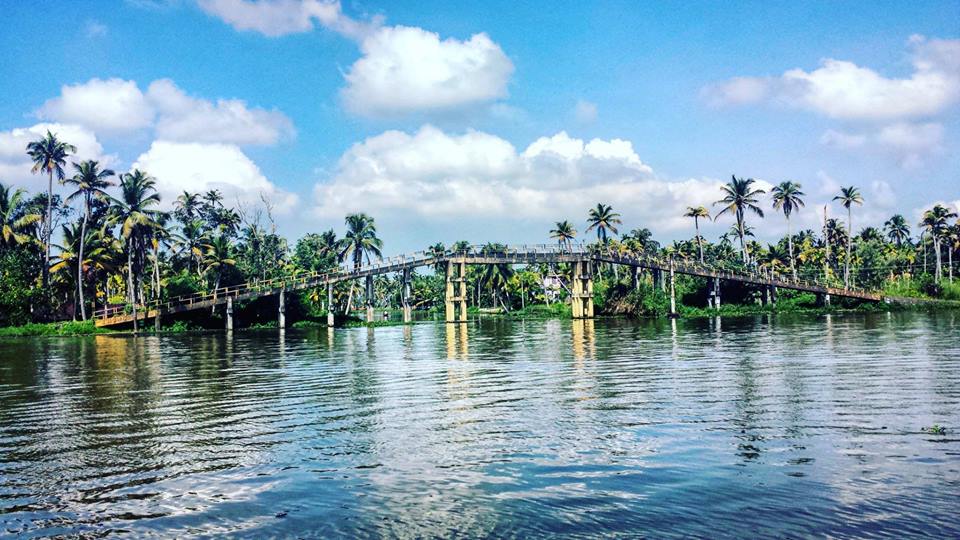-
Posts
4 -
Joined
-
Last visited
-
Days Won
2
Reputation Activity
-
 Megan Bonetti got a reaction from Simon for a blog entry, Conferencing Climate Change: Teamwork or Tug-of-war?
Megan Bonetti got a reaction from Simon for a blog entry, Conferencing Climate Change: Teamwork or Tug-of-war?
India. Culture, cows and rubbish. As an Aussie living for a short time in India it is such an intriguing country. Indians love their diverse nation yet they use the streets like rubbish dumps. Even my friends here tell me it’s ok to throw my paddle-pop wrapper out the car window. I can’t… so I just hold it tight and wait till I get home. Growing up in Australia, those ‘emu hunts’ in primary school have willed my littering days away. Yet I suspect that even my household trash bin will just be dumped across the road for the cows to eat or worse still, burnt on the street…for the cows to eat. This is India. Love it or hate it. (#tii)
As an Australian social worker volunteering with an NGO in Southern India I witness the large divide between the rich and poor of this incredibly colourful nation. I work with many children whose whole families have had to migrate from various parts of India due to the rapid effects of drought on their land and the significant urbanisation of major cities in the last 10 years. It turns out India has seen a boom in it’s industrial and technological trades a little later than it’s western neighbours and they are loving it.
But India’s urban boom is threatened with westerners telling them they have to stop producing and polluting. The earth doesn’t like it. Sorry India…We made our big capitalist bucks, but you don’t get that chance. Just when things are getting good and you’re developing astronomically, your main source of energy is being taken away.
It turns out fossil fuels are the cheapest form of energy for the developing world, especially as they try in earnest to develop the same standard of living as we have. So as one the most formidable countries in the developing world, India not only has the pressures of navigating a massive population but also has to figure out how to go green on the cheap.
It’s interesting that the Turnbull government has reluctantly agreed on a 5% reduction in carbon emissions in the next five years. “Phew! Glad we got through that one boys.” They wipe their sweaty brows while developing countries are drowning, burning and trying to survive on scant resources. These countries are just trying to make a crust, while Eurocentric nations are slowly turning a baguette into organic multigrain sourdough (and throwing the crusts to their hobby cows).
If the 2015 United Nations Climate Change Conference in Paris is truly the last attempt for international cooperation, leaders cannot just show and tell their contribution and sit back with folded arms. But how can mere human individuals promote serious teamwork?
This brings me back to the children I work with here in India. Every day their parent’s lives are tied to corrupt building associations. They are bonded labourers—gypsies moving from construction to construction. These families have no hope of returning to their now desolate homeland and are not provided social security measures that protect their livelihood. Then there is India’s neighbour, low-lying Bangladesh, experiencing saltwater intrusion that poisons whole water supplies for entire villages. In our own backyard we see Australian farmers shooting all their cattle only to turn the gun on themselves under the shadow of unprecedented drought. This is human impact.
Global warming is not just about penguins and polar bears. Climate change is a social justice issue. We live in a globalised world. The industrial revolution brought us here; and climate change is the consequence. No longer do we just neighbour cities, we neighbour nations. The leaders of Australia must be held accountable to all their neighbours including the ones just trying to keep their head above water. It simply won’t do for wealthy nations, such as Australia, to show the world their own country’s carbon reductions and sit back down. This summit can’t work as a set menu; it has to be a potluck dinner, a time for sharing, understanding and safeguarding.
For the sake of our beautiful earth and the many diverse cultures of the human race, this time I hope and pray that the leaders of the world provide a resounding voice for the marginalised. This summit and our government must not stop at figures, but uphold the basic democratic and human rights principles that cradle modern society. The United Nations was created so that man-made and worldwide calamities could no longer grasp our world with such authority. Well, it turns out a world war with Mother Nature is knocking on our doorstep. Will we listen and respond? I hope so.
For more information please visit the below links. They offer great insights into climate change realities and are positive and accessible resources for engaging the conversation.
The reality of climate change | David Puttnam | TEDxDublin
https://www.youtube.com/watch?v=SBjtO-0tbKU
India: Climate Change Impacts
http://www.worldbank.org/en/news/feature/2013/06/19/india-climate-change-impacts
Climate Change and the End of Australia
http://www.rollingstone.com/politics/news/climate-change-and-the-end-of-australia-20111003
The Critical Decade: Climate Change and Health (Australia)
http://www.climatecouncil.org.au/uploads/1bb6887d6f8cacd5d844fc30b0857931.pdf
GoPro: Climate Change and the Optimistic Future
https://www.youtube.com/watch?v=sT6jtTtsG_M
Paris Climate Conference: COP21 Explained
https://www.youtube.com/watch?v=1-qd8YCaoQ4
Why is the Paris UN climate summit important?
https://www.youtube.com/watch?v=lnztR5JllA4
Adam asks new PM Malcolm Turnbull on climate change in Question Time
https://www.youtube.com/watch?v=cqXtKt-Is54
Morgan Freeman's Powerful Climate Change Short Film
https://www.youtube.com/watch?v=8YQIaOldDU8
-
 Megan Bonetti got a reaction from Ann Hunt for a blog entry, Climate Change Dialogues: Denialists and the Disadvantaged
Megan Bonetti got a reaction from Ann Hunt for a blog entry, Climate Change Dialogues: Denialists and the Disadvantaged
Megan Bonetti | Australia: Brisbane
Recently I had a conversation with a close friend on climate change. The discussion captivated me with the multilayered tensions of the global north and capitalist ideologies that doggedly influence the very present concern of global warming and relating social policy.
Amongst a general catch-up I queried my friend’s thoughts on climate change issues. His stark and unexpected response, “we evolve, we move on.”
…Excuse me?
I admired the honesty. His was a real-world response of neo-liberal thought. It was brutal and it was heartless. At least he had the guts to say what many are thinking (Cook, 2014).
The social worker in me petitioned him with the human impacts: African farmers encumbered by draught (Dube et al., 2013; Kurukulasuriya et al., 2006; Mayer, 2013), Pacific Islanders inundated by sea water (IPCC, 2014; PIANGO, 2014, Duvat, 2013), people leaving their homelands due to ever-increasing health and environmental dangers (National Geographic, 2015; UNHCR, 2011).
Again, he fires back with “survival of the fittest” rhetoric.
Unfortunately the climate movement has failed to gain the widespread appeal needed to pass significant climate policy and practical reform (Bullard & Müller, 2012). Industrial giants continue to produce and pollute and people like my friend; devalue the real catastrophe that is climate change (Amnesty International, 2014, 2015; Cook, 2015). While global aid organisations declare humanitarian catastrophe as a result of manmade pollution, industrial conservatives spin myths of global evolution and adaption (IPCC, 2014; Cook, 2014; UNFCCC, 2015).
Local, national and global repetition of climate change catastrophe does not seem to be creating a civilizational wake up call. Moreover messages delivered in the language of fires, floods, droughts and extinction must not be blatant enough to be convincing (Klein, 2014; McKinnon, 2014). So if individuals, like my friend, and carbon emitters like, AGL energy aren’t listening, what can we do (CER, 2015, Garnaut, 2011)?
Upon hearing my friend’s response to climate change I felt the need to blame him and many like him for their self-righteous ideologies that have significantly impacted the global poor (Böhm, 2012). However, history shows that the human race is really good at pointing blame. Years earlier I too was reluctant to participate in the climate conversation. The debate seemed wonky with excessive jargon. Yet I was unwittingly converted from the influences of a conservative upbringing to that of a less traditional “tree-hugger.” So, how did this happen?
There was no halogen light-bulb moment nor was I convinced by the volatile debate and environmental doom. For me, it was the slow unpacking of climate change in a tangible context. This was influenced through a community of people who impacted my values on sustainable living and more importantly did not guilt trip me if I put glad-wrap in the recycling bin.
Studies have shown that many individuals and communities feel disempowered or ignorant when discussing climate change, so in response there is silence (Szarka, 2013). Researchers suggest that protecting the rights of those disadvantaged by climate change will only occur when a non-judgemental culture of education and awareness is fostered in the discussion (Sasser, 2014; Smith, 2011). Only when climate change becomes an accessible conversation rather than a heated debate will key stakeholder’s sit-up and listen (Head et al., 2014; Luers, 2013). A movement for positive change in the environment will spread only when people, like my friend, can drop their defences and feel empowered to enter the conversation (Abney-Korn et al., 2013).
REFERENCES
Abney-Korn, K., Cassiman, S., & Fleetham, D. (2013). While we were sleeping: From dystopia to global awakening. Perspectives on Global Development and Technology, 12(1-2), 80-97. doi:10.1163/15691497-12341244
Amnesty International. (2014). Five Countries Vulnerable to Climate Change. Retrieved from http://www.amnesty.org.au/features/comments/35603/
Amnesty International. (2015). Nigeria: Hundreds of Oil Spills continue to Blight Niger Delta. Retrieved from https://www.amnesty.org/en/articles/news/2015/03/hundreds-of-oil-spills-continue-to-blight-niger-delta/
Australian Government. (2015). Clean Energy Regulator: National Greenhouse and Energy Reporting. Retrieved from http://www.cleanenergyregulator.gov.au/National-Greenhouse-and-Energy-Reporting/Pages/default.aspx
Böhm, S., Misoczky, M. C., & Moog, S. (2012). Greening capitalism?: A marxist critique of carbon markets. Organization Studies, 33(11), 1617-1638. doi:10.1177/0170840612463326
Bullard, N., & Müller, T. (2012). Beyond the green economy: System change, not climate change. Development, 55(1), 54-62. doi:10.1057/dev.2011.100
Cook, J. (2015). Explaining Climate Change Science & Rebutting Global Misinformation. Retrieved from http://www.skepticalscience.com/climate-change-little-ice-age-medieval-warm-period.htm
Dube, S., Scholes, R. J., Nelson, G. C., Mason-D'Croz, D., & Palazzo, A. (2013). South African food security and climate change: Agriculture futures. Economics, 7(35), 0_1.
Duvat, V. (2013). Coastal protection structures in Tarawa Atoll, Republic of Kiribati. Sustainability Science, 8(3), 363-369. Retrieved, April 29, from http://link.springer.com.ezp01.library.qut.edu.au/article/10.1007%2Fs11625-013-0205-9
Garnaut, R. (2011). Garnaut Climate Change Review – update 2011: Australia in the Global Response to Climate Change. Retrieved from http://www.garnautreview.org.au/update-2011/update-papers/up6-carbon-pricing-and-reducing-australias-emissions.pdf
Head, L., Adams, M., McGregor, H. V., & Toole, S. (2014). Climate change and Australia. Wiley Interdisciplinary Reviews: Climate Change, 5(2), 175-197. doi:10.1002/wcc.255
Intergovernmental Panel on Climate Change. (2014). Summary for Policy makers- Climate Change 2014: Impacts, adaptation and vulnerability. Retrieved, March 1, from http://ipcc-wg2.gov/AR5/images/uploads/IPCC_WG2AR5_SPM_Approved.pdf
Klein, N. (2014). This Changes Everything: Capitalism vs. Climate Change. New York, NY: Simon & Schuster.
Kurukulasuriya, P., Mendelsohn, R., Hassan, R., Benhin, J., Deressa, T., Diop, M., Dinar, A. (2006). Will african agriculture survive climate change? The World Bank Economic Review, 20(3), 367-388. doi:10.1093/wber/lhl004
Luers, A. (2013). Rethinking US climate advocacy. Climatic Change, 120(1), 13-19. doi:10.1007/s10584-013-0797-1
Mayer, A. (2013). Climate change already challenging agriculture. Bioscience, 63(10), 781-787. doi:10.1525/bio.2013.63.10.2
McKinnon, C. (2014). Climate change: Against despair. Ethics & the Environment, 19(1), 31-48. doi:10.2979/ethicsenviro.19.1.31
National Geographic. (2015). Education: Climate Refugee. Retrieved from http://education.nationalgeographic.com.au/education/encyclopedia/climate-refugee/?ar_a=1
Pacific Islander Association of Non-governmental Organisations. (2014). The Pacific Score on the Millennium Development Goals. Retrieved, April 29, from http://www.piango.org/Publications/publications.html
Sasser, J. S. (2014). The wave of the future? youth advocacy at the nexus of population and climate change. The Geographical Journal, 180(2), 102-110. doi:10.1111/geoj.12023
Seabright, M. (2010). The role of the affect heuristic in moral reactions to climate change. Journal of Global Ethics, 6(1), 5-15. doi:10.1080/17449621003701410
Smith, B. (2011). Doom, gloom and empty tombs: Climate change and fear. Studies in Christian Ethics, 24(1), 77-91. doi:10.1177/0953946810389120
Szarka, J. (2013). From climate advocacy to public engagement: An exploration of the roles of environmental non-governmental organisations. Climate, 1(1), 12-27. doi:10.3390/cli1010012
-
 Megan Bonetti got a reaction from Simon for a blog entry, Climate Change Dialogues: Denialists and the Disadvantaged
Megan Bonetti got a reaction from Simon for a blog entry, Climate Change Dialogues: Denialists and the Disadvantaged
Megan Bonetti | Australia: Brisbane
Recently I had a conversation with a close friend on climate change. The discussion captivated me with the multilayered tensions of the global north and capitalist ideologies that doggedly influence the very present concern of global warming and relating social policy.
Amongst a general catch-up I queried my friend’s thoughts on climate change issues. His stark and unexpected response, “we evolve, we move on.”
…Excuse me?
I admired the honesty. His was a real-world response of neo-liberal thought. It was brutal and it was heartless. At least he had the guts to say what many are thinking (Cook, 2014).
The social worker in me petitioned him with the human impacts: African farmers encumbered by draught (Dube et al., 2013; Kurukulasuriya et al., 2006; Mayer, 2013), Pacific Islanders inundated by sea water (IPCC, 2014; PIANGO, 2014, Duvat, 2013), people leaving their homelands due to ever-increasing health and environmental dangers (National Geographic, 2015; UNHCR, 2011).
Again, he fires back with “survival of the fittest” rhetoric.
Unfortunately the climate movement has failed to gain the widespread appeal needed to pass significant climate policy and practical reform (Bullard & Müller, 2012). Industrial giants continue to produce and pollute and people like my friend; devalue the real catastrophe that is climate change (Amnesty International, 2014, 2015; Cook, 2015). While global aid organisations declare humanitarian catastrophe as a result of manmade pollution, industrial conservatives spin myths of global evolution and adaption (IPCC, 2014; Cook, 2014; UNFCCC, 2015).
Local, national and global repetition of climate change catastrophe does not seem to be creating a civilizational wake up call. Moreover messages delivered in the language of fires, floods, droughts and extinction must not be blatant enough to be convincing (Klein, 2014; McKinnon, 2014). So if individuals, like my friend, and carbon emitters like, AGL energy aren’t listening, what can we do (CER, 2015, Garnaut, 2011)?
Upon hearing my friend’s response to climate change I felt the need to blame him and many like him for their self-righteous ideologies that have significantly impacted the global poor (Böhm, 2012). However, history shows that the human race is really good at pointing blame. Years earlier I too was reluctant to participate in the climate conversation. The debate seemed wonky with excessive jargon. Yet I was unwittingly converted from the influences of a conservative upbringing to that of a less traditional “tree-hugger.” So, how did this happen?
There was no halogen light-bulb moment nor was I convinced by the volatile debate and environmental doom. For me, it was the slow unpacking of climate change in a tangible context. This was influenced through a community of people who impacted my values on sustainable living and more importantly did not guilt trip me if I put glad-wrap in the recycling bin.
Studies have shown that many individuals and communities feel disempowered or ignorant when discussing climate change, so in response there is silence (Szarka, 2013). Researchers suggest that protecting the rights of those disadvantaged by climate change will only occur when a non-judgemental culture of education and awareness is fostered in the discussion (Sasser, 2014; Smith, 2011). Only when climate change becomes an accessible conversation rather than a heated debate will key stakeholder’s sit-up and listen (Head et al., 2014; Luers, 2013). A movement for positive change in the environment will spread only when people, like my friend, can drop their defences and feel empowered to enter the conversation (Abney-Korn et al., 2013).
REFERENCES
Abney-Korn, K., Cassiman, S., & Fleetham, D. (2013). While we were sleeping: From dystopia to global awakening. Perspectives on Global Development and Technology, 12(1-2), 80-97. doi:10.1163/15691497-12341244
Amnesty International. (2014). Five Countries Vulnerable to Climate Change. Retrieved from http://www.amnesty.org.au/features/comments/35603/
Amnesty International. (2015). Nigeria: Hundreds of Oil Spills continue to Blight Niger Delta. Retrieved from https://www.amnesty.org/en/articles/news/2015/03/hundreds-of-oil-spills-continue-to-blight-niger-delta/
Australian Government. (2015). Clean Energy Regulator: National Greenhouse and Energy Reporting. Retrieved from http://www.cleanenergyregulator.gov.au/National-Greenhouse-and-Energy-Reporting/Pages/default.aspx
Böhm, S., Misoczky, M. C., & Moog, S. (2012). Greening capitalism?: A marxist critique of carbon markets. Organization Studies, 33(11), 1617-1638. doi:10.1177/0170840612463326
Bullard, N., & Müller, T. (2012). Beyond the green economy: System change, not climate change. Development, 55(1), 54-62. doi:10.1057/dev.2011.100
Cook, J. (2015). Explaining Climate Change Science & Rebutting Global Misinformation. Retrieved from http://www.skepticalscience.com/climate-change-little-ice-age-medieval-warm-period.htm
Dube, S., Scholes, R. J., Nelson, G. C., Mason-D'Croz, D., & Palazzo, A. (2013). South African food security and climate change: Agriculture futures. Economics, 7(35), 0_1.
Duvat, V. (2013). Coastal protection structures in Tarawa Atoll, Republic of Kiribati. Sustainability Science, 8(3), 363-369. Retrieved, April 29, from http://link.springer.com.ezp01.library.qut.edu.au/article/10.1007%2Fs11625-013-0205-9
Garnaut, R. (2011). Garnaut Climate Change Review – update 2011: Australia in the Global Response to Climate Change. Retrieved from http://www.garnautreview.org.au/update-2011/update-papers/up6-carbon-pricing-and-reducing-australias-emissions.pdf
Head, L., Adams, M., McGregor, H. V., & Toole, S. (2014). Climate change and Australia. Wiley Interdisciplinary Reviews: Climate Change, 5(2), 175-197. doi:10.1002/wcc.255
Intergovernmental Panel on Climate Change. (2014). Summary for Policy makers- Climate Change 2014: Impacts, adaptation and vulnerability. Retrieved, March 1, from http://ipcc-wg2.gov/AR5/images/uploads/IPCC_WG2AR5_SPM_Approved.pdf
Klein, N. (2014). This Changes Everything: Capitalism vs. Climate Change. New York, NY: Simon & Schuster.
Kurukulasuriya, P., Mendelsohn, R., Hassan, R., Benhin, J., Deressa, T., Diop, M., Dinar, A. (2006). Will african agriculture survive climate change? The World Bank Economic Review, 20(3), 367-388. doi:10.1093/wber/lhl004
Luers, A. (2013). Rethinking US climate advocacy. Climatic Change, 120(1), 13-19. doi:10.1007/s10584-013-0797-1
Mayer, A. (2013). Climate change already challenging agriculture. Bioscience, 63(10), 781-787. doi:10.1525/bio.2013.63.10.2
McKinnon, C. (2014). Climate change: Against despair. Ethics & the Environment, 19(1), 31-48. doi:10.2979/ethicsenviro.19.1.31
National Geographic. (2015). Education: Climate Refugee. Retrieved from http://education.nationalgeographic.com.au/education/encyclopedia/climate-refugee/?ar_a=1
Pacific Islander Association of Non-governmental Organisations. (2014). The Pacific Score on the Millennium Development Goals. Retrieved, April 29, from http://www.piango.org/Publications/publications.html
Sasser, J. S. (2014). The wave of the future? youth advocacy at the nexus of population and climate change. The Geographical Journal, 180(2), 102-110. doi:10.1111/geoj.12023
Seabright, M. (2010). The role of the affect heuristic in moral reactions to climate change. Journal of Global Ethics, 6(1), 5-15. doi:10.1080/17449621003701410
Smith, B. (2011). Doom, gloom and empty tombs: Climate change and fear. Studies in Christian Ethics, 24(1), 77-91. doi:10.1177/0953946810389120
Szarka, J. (2013). From climate advocacy to public engagement: An exploration of the roles of environmental non-governmental organisations. Climate, 1(1), 12-27. doi:10.3390/cli1010012



